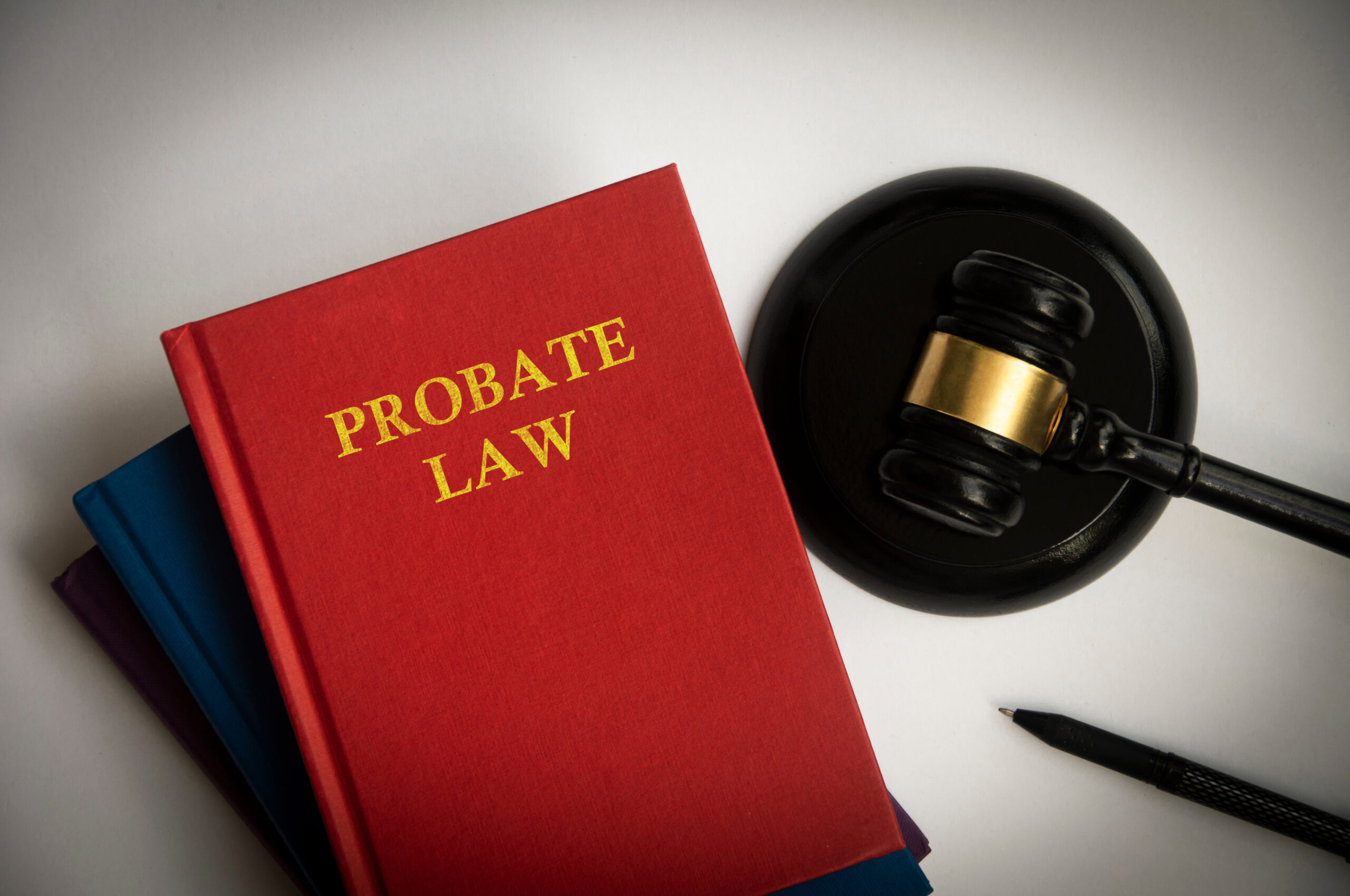
Top view of probate law book with gavel on white background. Law concept.
Estate management can feel overwhelming after the loss of a loved one. However, the inevitable can’t be put off for very long. The departed’s assets are distributed to beneficiaries, and any remaining debts are settled through a legal process called probate. Whether the deceased left a will or not, probate ensures that their estate is handled according to state laws.
Understanding how this process works—and how long it may take—can help ease some of the stress involved. Continue reading this article to learn more.
What Is Probate?
Probate is a court-supervised legal proceeding that validates a deceased person’s will, if one exists, and oversees the administration of their estate. If no will was left, intestate succession laws determine how the assets are distributed among legal heirs. The process involves identifying the deceased’s probate assets, settling valid debts, and transferring the remaining property to the rightful beneficiaries.
Probate assets typically include real estate, bank accounts, and personal property that were solely owned by the deceased. Unlike probate assets, which require court supervision for transfer, non-probate assets like life insurance, retirement accounts with beneficiaries, and jointly owned property follow their own transfer mechanisms directly to the named individuals.
Various legal requirements are associated with the process, which is usually handled by a probate attorney.
Key Steps in the Probate Process
The probate process follows a structured series of steps designed to ensure the deceased’s assets are appropriately managed, debts are settled, and inheritances are distributed according to the law or their final wishes.
1. Filing a Petition
The probate proceeding begins when a petition is filed in probate court, usually by the executor named in the will. If no will exists, an interested party—such as an adult child, domestic partner, or another close relative—may petition the court to be appointed as the administrator of the estate. The court first checks if there’s a valid will and then gives the executor or administrator official paperwork that proves they have legal authority to handle the estate matters.
2. Notifying Creditors and Heirs
Once the estate is opened, the court requires public notice to inform potential creditors and heirs of the probate proceeding. The probate court mandates a statutory creditor claim period, generally ranging from three to nine months depending on jurisdiction, during which all potential claimants must file verified proof of debt or risk having their claims barred. Executors must also notify known heirs and beneficiaries, ensuring transparency throughout the process.
3. Inventorying the Estate
The person handling the estate needs to make a complete list of everything the deceased owned – houses, money accounts, and personal items. Some things automatically go to co-owners or named beneficiaries without going through probate. Proper documentation is essential to avoid disputes and ensure an accurate distribution of assets.
4. Paying Debts and Taxes
Settling the deceased’s financial obligations is a crucial prerequisite for inheritance distribution. This includes paying final expenses like funeral arrangements, outstanding medical bills, and any owed taxes. If the estate owes federal or state estate taxes, the executor must file the necessary tax returns and ensure payment. Creditors are paid in a specific order, as dictated by state law, and any remaining funds are then distributed to heirs.
5. Distributing Assets to Beneficiaries
After paying off taxes and debts, the executor distributes the remaining estate assets according to the will or intestacy laws. In some cases, the court may require a final accounting of beneficiaries detailing how assets were managed and distributed. If disputes arise—such as challenges to the will’s validity or claims of undue influence—the process may be delayed until resolutions are reached.
While these steps provide a general framework, each estate’s unique circumstances—from asset types to family dynamics—can influence how smoothly and quickly the probate process unfolds.
Special Considerations for Digital Assets in Probate
Modern estate planning often fails to address the full spectrum of digital property, which encompasses financial accounts, communication platforms, digital currencies, and subscription-based services that hold both monetary and sentimental value. Indeed, it has become an increasingly important category of estate property.
Most states now recognize digital assets as part of the probate estate, but accessing them can be complicated. Many online platforms have strict terms of service that may prohibit account transfers or require specific authorization procedures. Though RUFADAA provides a legal framework for digital asset access in participating states, executors should anticipate navigating varying authentication and release procedures across different online platforms.
To properly handle digital assets during probate:
-
- Create an inventory of all digital accounts and assets
- Store login credentials securely (using a password manager or encrypted document)
- Designate digital asset access in your estate plan
- Understand each platform’s policies regarding deceased users
- Take your digital assets into account when creating your will or trust documents
Without proper planning, crucial digital property—from family photos stored in the cloud to valuable cryptocurrency wallets—could become inaccessible during the probate process. An estate planning attorney can help incorporate digital assets into your overall estate strategy, ensuring these modern holdings are treated with the same care as traditional property.
How Long Does Probate Take?
During an already difficult time, it’s essential to know that probate timelines vary widely based on your loved one’s specific circumstances, from what they left behind to whether family members agree about the estate. Simple estates with straightforward assets and no conflicts may be settled in as little as six to twelve months. However, more complicated estates—such as those involving extensive real estate holdings, business interests, or contested wills—can take years to resolve.
Some states offer simplified probate procedures for smaller estates or provide alternatives, such as small estate affidavits or transfer-on-death designations, which can expedite the process. Additionally, assets held in a living trust typically bypass probate entirely, allowing for quicker and more private distribution to beneficiaries.
Do You Need a Probate Lawyer?
While simple estates might not require legal help, families often find tremendous value in working with a probate attorney during this difficult time. A skilled lawyer can shoulder the burden of complex legal procedures, handle all necessary court filings, and help prevent or resolve family disagreements about the estate. They can also ensure that the executor fulfils their duties correctly, minimizing the risk of legal challenges.
Proper estate planning—such as creating a will, establishing trusts, and designating beneficiaries—can help streamline the process and reduce the burden on loved ones. Meanwhile, an estate planning attorney or a financial advisor can provide further clarity and peace of mind.
Conclusion
While navigating probate can feel overwhelming—particularly when coping with loss—having a clear understanding of the process and enlisting professional support when necessary can significantly ease the burden of estate administration. Whether settling a carefully planned will or navigating intestacy laws, proper preparation and legal guidance can make a significant difference in efficiently transferring assets to the rightful beneficiaries.













